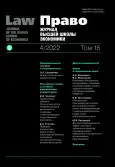Establishing of Subject of Rights to Intellectual Property Created with Use of Artificial Intelligence
- Authors: Kalyatin V.1
-
Affiliations:
- Private Law Studies Center under the President of the Russian Federation
- Issue: Vol 15, No 4 (2022)
- Pages: 24-50
- Section: Russian Law: Condition, Perspectives, Commentaries
- URL: https://journal-vniispk.ru/2072-8166/article/view/318202
- DOI: https://doi.org/10.17323/2072-8166.2022.4.24.50
- ID: 318202
Cite item
Full Text
Abstract
Artificial Intelligence (AI) applies now in all areas of the mankind activity, including creation of new films, music, modern technologies, etc. However, active use of AI during creation of intellectual property causes substantial problems for legislator and courts concerning definition of relevant legal regime of such works and finding the place of artificial intelligence in the legal system. Even the notion of AI is still the subject of discussion, all the more so there are active discussions regarding definition of a subject of rights to products created by AI. Traditional regulation requires protection of IP with human’s activity, and, in the framework of continental legal system, creativity. As a result firms applying AI indicate fictive authors to protect relevant intellectual property. In the doctrine some variants of protection of such works are suggested, including protection of rights of AI developer, person who organized of artificial intelligence, investor, AI’ user, AI itself, etc. In the article possible models of regulation are analyzed as well as perspectives of its implementation and possible results. The main conclusion is that among the many possible variants of definition of rights to the works created by artificial intelligence, only few deserve attention among which option of introduction of specific limited related rights of a person who organized of artificial intelligence is the most perspective. This model is similar with constructions are used in the civil law: phonograms producer rights, air and cable broadcasting bodies rights, database producers’ rights. There is some experience of use of such model in several countries. Thus, use of artificial intelligence in the intellectual property sphere requires developing of existing legal regimes rather than substantial reconstruction of the legal regulation.
About the authors
Vitaly Kalyatin
Private Law Studies Center under the President of the Russian Federation
Email: noreply@hse.ru
ORCID iD: 0000-0002-2927-6591
Professor, Candidate of Sciences (Law)
References
- Bently L., Sherman B. (2004) Intellectual Property Law. Oxford: University Press, 1131 p.
- Butler T. (1982) Can Computer be an Author. Copyright Aspects of AI. Hastings Comm & Ent., no. 4, pp. 707-747.
- Dozortcev V.A. (2003) Copyright for Film as Complex Multi-Word Composition. In: Intellectual Copyright. Term. System. Codification. Moscow: Statut, pp. 143-170 (in Russ.)
- Feather J. (2010) The Significance of Copyright History. In: Privilege and Property. Essays on History of Copyright. Cambridge: Open Book Publishers, pp. 359-368. DOI:https://doi.org/10.2307/j.ctt5vjt9v.18
- Garnett K., James J., Davies G. (1999) Copinger and Skone James on Copyright. London: Sweet & Maxwell, 1225 p.
- Jaszi P. (1992) On the Author Effect: Contemporary Copyright and Collective Creativity. Cardozo Arts and Entertainment Law Journal, no. 2, pp. 293-320.
- Karapetov A.G. (2016) Economic Analysis of Law. Moscow: Statut, 528 p. (in Russ.)
- Morhat P.M. (2019) AI in Sphere of Intellectual Property Law. Doctor of Juridical Sciences Thesis. Moscow, 420 p. (in Russ.)
- Naumov V.B., Tituk E.V. (2018) Legal Status of AI Creativity. Pravovedeniye=Legal Studies, no. 3, pp. 531-540 (in Russ.)
- Nazarov N. (2020) Recognizing Authorship for Results of Intellectual Works Created by AI. Intellectualnaya sobstvennost, avtorskoye parvo i smezhnye prava=Intellectual Property, Copyright and Adjacent Rights, no. 3, pp. 53-62 (in Russ.)
- Perri M., Margoni T. (2010) From Music Tracks to Google Maps: Who Owns ComputerGenerated Works? Computer Law and Security Review, no. 6, pp. 621-629. DOI:https://doi.org/10.1016/j.clsr.2010.09.005
- Prange D., Lawson A. (2018) Re-Evaluating Companies' AI Protection Strategies. Managing Intellectual Property, vol. 2, pp. 35-38.
- Rai A.K. (1999) Regulating Research: Intellectual Property Rights and the Norms of Science. Northwestern University Law Review, no. 1, pp. 77-152. DOI:https://doi.org/10.2139/ssrn.172032
- Samuelson P. (1986) Allocating Ownership Rights in Computer-Generated Works. University of Pittsburgh Law Review, vol. 47, pp. 1185-1204.
- Searle J. (1980) Minds, Brains and Programs. The Behavioral and Brain Sciences, no. 3, pp. 417-457. DOI:https://doi.org/10.1017/S0140525X00005756
- Selvadurai N., Matulionyte R. (2020) Copyright Protection for Works Generated Using AI. Journal of Intellectual Property Law & Practice, no. 7, pp. 536-543. DOI:https://doi.org/10.1093/jiplp/jpaa062
- Serebrovskiy V.I. (1956) Aspects of Soviet Copyright. Moscow: Akademia nauk, 283 p. (in Russ.)
- Sesitskiy E.P. (2018) Legal Protection of Results Created by AI. Candidate of Legal Sciences Thesis. Moscow, 218 p. (in Russ.)
- Solum L. (1992) Legal Personhood for Artificial Intelligences. North Carolina Law Review, vol. 70, no. 4, pp. 1231-1287.
- Vaver D. (1994) Translation and Copyright: A Canadian Focus. European Intellectual Property Review, no. 4, pp. 159-166.
- Yu.R. (2017) The Machine Author: What Level of Copyright Protection is Appropriate For Fully Independent Computer-Generated Works? University of Pennsylvania Law Review, vol. 165, pp. 1266-1268.
Supplementary files








